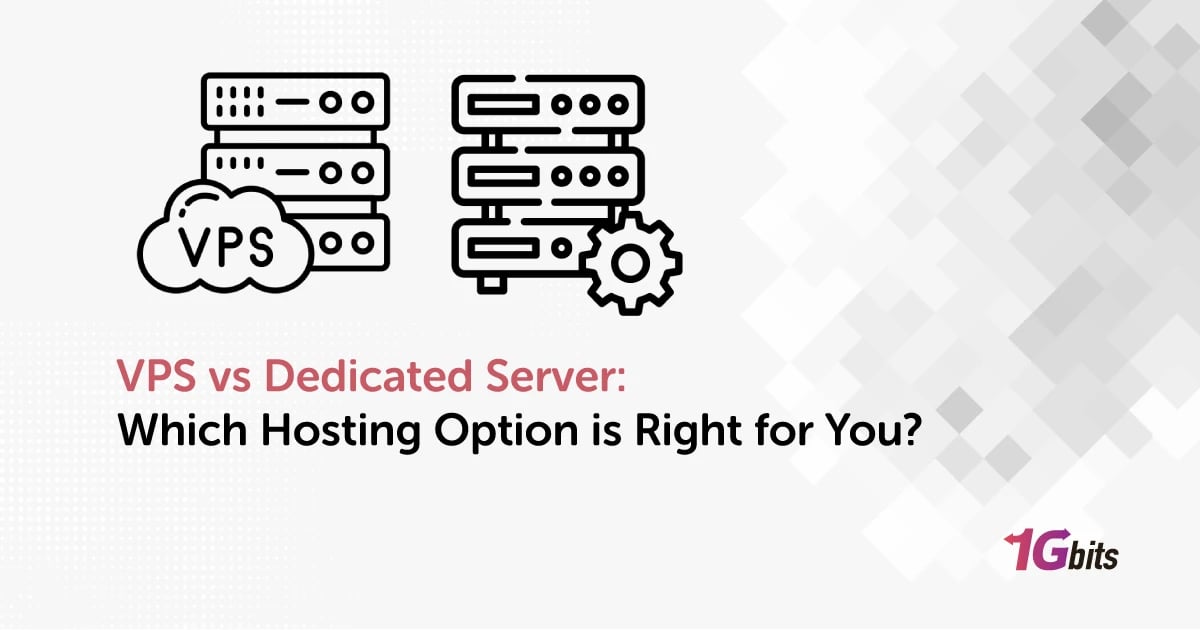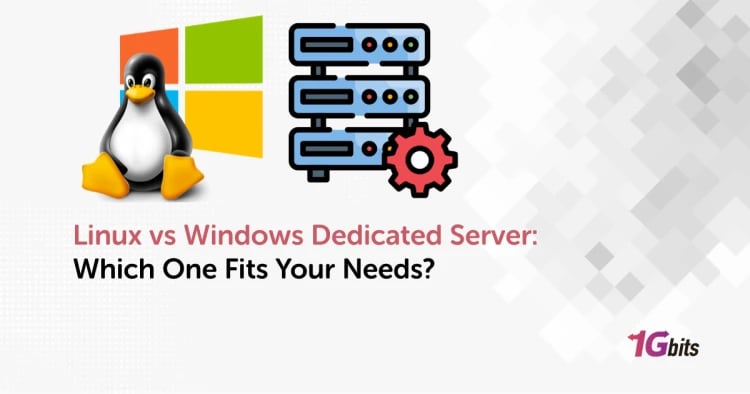Choosing the right hosting solution is crucial for your website’s performance, security, and scalability. Many businesses and individuals find themselves debating between VPS vs dedicated server hosting. Both options provide powerful hosting environments, but they cater to different needs. In this article, we will explore the difference between VPS and dedicated server hosting, compare their performance, cost, and ideal use cases, and help you determine which solution is the best fit for your website or application.
If you're considering a cost-effective solution, exploring options for a cheap VPS might be a great starting point before committing to a dedicated server.
Understanding VPS Hosting
A Virtual Private Server (VPS) is a hosting solution where a physical server is divided into multiple virtual environments using virtualization technology. Each VPS operates independently with its own resources, including CPU, RAM, and storage, making it more powerful and secure than shared hosting.
Advantages of VPS Hosting
-
Cost-Effective – VPS hosting is significantly cheaper than a dedicated server while still providing better performance than shared hosting.
-
Scalability – You can easily upgrade your resources as your website grows.
-
Better Security – Since each VPS is isolated, your data remains secure even if other VPS users on the same server experience issues.
-
Root Access – Unlike shared hosting, VPS users get administrative access, allowing for full customization.
-
Balance Between Performance and Cost – Compared to a dedicated server, VPS offers a solid balance of power and affordability.
For a more in-depth look, check out our guide on What Is VPS Hosting.
Understanding Dedicated Server Hosting
A dedicated server is a physical server entirely reserved for one user or business. This means you get full control over the server’s hardware and software, leading to maximum performance and security.
Advantages of Dedicated Server Hosting
-
High Performance – With dedicated resources, your server can handle high traffic, large databases, and resource-intensive applications.
-
Enhanced Security – Since you are the only user on the server, security risks are significantly reduced.
-
Full Customization – You can configure the hardware and software to match your specific needs.
-
Reliability – Dedicated servers provide unmatched uptime and stability.
If you want to explore the specifics of dedicated hosting, read our guide on What is a Dedicated Server.
VPS vs Dedicated Server: Key Differences
Choosing between a VPS (Virtual Private Server) and a dedicated server depends on your specific needs, budget, and technical requirements. Below is an in-depth comparison of the key VPS vs dedicated server differences:
If you're unsure which option suits you best, consider testing a VPS with a trial VPS to experience its performance before making a decision.
Performance
Performance is one of the most critical factors when selecting a hosting solution. A dedicated server vs VPS provides the highest level of performance because it offers exclusive access to hardware resources, including CPU, RAM, and storage.
On the other hand, VPS hosting operates on a virtualized environment within a physical server, where multiple VPS instances share the same hardware. While it delivers better performance than shared hosting, it does not match the power of a dedicated server.
Security
Security is another key distinction. A dedicated server ensures maximum security since you are the only user on the machine. This isolation eliminates the risks associated with sharing resources, such as cross-tenant attacks, vulnerabilities from other users, or noisy neighbors impacting system integrity.
A VPS is more secure than shared hosting because it provides an isolated environment, but since multiple VPS instances exist on the same physical hardware, there is still some level of shared risk.
Customization
When it comes to customization, dedicated servers offer full control over both hardware and software. You can configure the server to meet your exact specifications, install custom operating systems, and fine-tune performance settings for your unique workload.
A VPS, however, has limitations in customization. While you can install and manage applications within the virtual environment, the underlying hardware and some system-level settings are controlled by the hosting provider. This makes VPS a great option for users who need flexibility but do not require complete control over the hardware.
For those looking to leverage the benefits of a VPS without the upfront costs of owning hardware, opting for a VPS rental service can be a cost-effective and scalable solution.
Cost
Pricing is one of the biggest differences between VPS and dedicated servers.
-
VPS Hosting: More affordable, typically ranging from $5 to $50 per month, depending on the allocated resources. This makes VPS an excellent option for startups, small businesses, and developers who need a private hosting environment without the high costs of a dedicated server.
-
Dedicated Hosting: Considerably more expensive, with prices ranging from $100 to over $500 per month based on the hardware configuration. The higher cost is justified by the exclusive access to high-performance hardware, making it ideal for enterprises, high-traffic websites, and resource-intensive applications.
If you're on a budget and need a private hosting environment, VPS hosting is a great choice. However, for businesses that require top-tier performance, a dedicated server is a worthwhile investment. You can explore Dedicated Server Pricing for a breakdown of costs.
Scalability
Scalability is another crucial factor in selecting the right hosting solution.
-
VPS Hosting: Easily scalable. You can increase CPU, RAM, or storage as your website grows without significant downtime or migration efforts. This flexibility makes VPS hosting a great choice for businesses with fluctuating traffic.
-
Dedicated Hosting: Scaling a dedicated server is more complex, as it requires hardware upgrades or even migrating to a new server. This makes it less flexible for rapidly growing businesses. However, if long-term stability is a priority, a dedicated server offers the necessary resources from the start.
Best Use Cases
-
VPS Hosting: Ideal for growing businesses, moderate-traffic websites, developers, and users who need a balance between performance and cost.
-
Dedicated Server Hosting: Best suited for high-traffic websites, enterprises, gaming servers, big data applications, and mission-critical workloads that demand maximum security, customization, and performance.
VPS vs Dedicated Server Performance
Performance is one of the primary considerations when choosing between a VPS vs dedicated hosting. A dedicated server outperforms a VPS because it has exclusive access to all hardware resources, ensuring consistent and reliable performance.
For medium-sized businesses and websites with moderate traffic, a VPS provides sufficient performance at a fraction of the cost of a dedicated server. However, if consistent high performance, minimal latency, and maximum reliability are required, a dedicated server is the superior choice.
Cost Comparison: VPS Hosting vs Dedicated Hosting
One of the biggest deciding factors between VPS vs dedicated server is cost.
VPS Hosting
-
Typically costs $5 to $50 per month, depending on the server specifications.
-
Offers a cost-effective way to access dedicated resources in a virtualized environment.
-
Suitable for small to medium-sized businesses, startups, and personal projects.
Dedicated Hosting
-
Costs range from $100 to over $500 per month, depending on the hardware.
-
Provides exclusive access to high-performance hardware.
-
Best for large enterprises, eCommerce platforms, and resource-intensive applications.
For users who need a budget-friendly hosting solution with flexibility, VPS hosting is a great choice. However, for those needing uncompromised power and security, investing in a dedicated server is worthwhile.
👉 Check out our Dedicated Server Pricing for a detailed breakdown.
VPS vs Dedicated Server for Gaming
Gaming servers require high performance, low latency, and stability.
-
Dedicated servers are the best choice for gaming because they offer powerful CPUs, high-speed SSD storage, and complete control over server settings. Popular multiplayer games like Minecraft, Counter-Strike, and ARK: Survival Evolved perform best on dedicated servers.
-
VPS hosting can handle smaller gaming communities or private servers, but performance may be inconsistent due to shared physical resources.
For serious gaming applications, a dedicated server is the best option.
If you’re looking for a VPS in a specific region, check out our guide on VPS locations to find the best server options near you.
VPS vs Cloud vs Dedicated Hosting
If you're unsure whether to choose a VPS or a dedicated server, cloud dedicated versus VPS is another comparison that you should consider.
-
VPS Hosting: Affordable and scalable, best for medium-sized businesses.
-
Dedicated Hosting: Provides maximum performance and security, best for enterprises.
-
Cloud Hosting: Scalable, with pay-as-you-go pricing, ideal for unpredictable traffic.
👉 If you're debating between VPS and dedicated hosting, cloud hosting might be a flexible middle ground.
Shared Hosting vs VPS vs Dedicated Server
For beginners, understanding the differences between shared hosting, VPS hosting, and dedicated hosting is essential.
-
Shared Hosting: The cheapest option, but resources are shared among multiple users, leading to slower performance and lower security.
-
VPS Hosting: A middle-ground solution with dedicated virtual resources, offering better performance and security than shared hosting.
-
Dedicated Hosting: The most powerful option, providing full control, unmatched performance, and maximum security.
For more insights on VPS server vs dedicated server, check out our Top 10 Benefits of Using VPS for Your Business.
Should You Choose a VPS or Dedicated Server?
To determine whether you need a VPS or dedicated server, consider the following:
-
Choose VPS Hosting If:
-
You are running a growing website with moderate traffic.
-
You need cost-effective hosting with scalability.
-
You require root access but not an entire server.
-
Choose Dedicated Server Hosting If:
-
Your website experiences high traffic and requires powerful resources.
-
You need maximum security and customization.
-
You operate a resource-intensive application such as gaming servers, streaming platforms, or large databases.
You may also want to explore Cheap Dedicated Servers if you're looking for a cost-effective solution with dedicated resources to handle high-performance applications.
Conclusion
When comparing VPS vs dedicated server, the right choice depends on your website’s traffic, security needs, and budget. VPS hosting is a great option for medium-scale businesses looking for cost-effective performance, while dedicated server hosting is the best solution for high-traffic websites needing superior power and security.
People also read:








